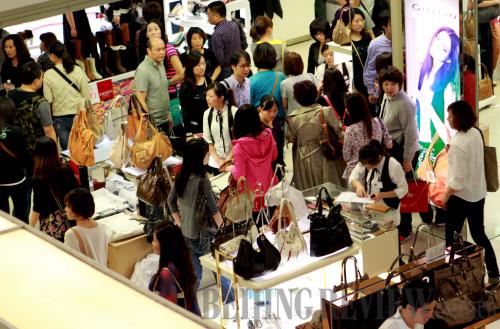|
 |
|
SHOPPERS, SHOPPERS EVERYWHERE: Consumers buy products at a shopping mall in Shanghai. China's consumer market has experienced a surge in retail sales (ZHANG MING) |
The Chinese economy grew a robust 9.6 percent in the third quarter of this year, maintaining its sound momentum even though the quarterly growth rate was 0.7 percentage points less than that of the second quarter, the National Bureau of Statistics (NBS) announced on October 21. The growth has been largely spurred by domestic consumption instead of foreign markets.
The Chinese economy grew 10.6 percent in the first three quarters of 2010, making the government target of an 8 percent GDP growth in 2010 attainable.
Normal growth
Since GDP growth reached a peak of 12.1 percent in the last quarter of 2009, China's economic growth has steadily slowed. The year-on-year first quarter GDP in 2010 grew 11.9 percent, followed by 10.3 percent in the second quarter and 9.6 percent in the third quarter.
Li Huiyong, chief macroeconomist at Shenyin and Wanguo Securities Co. Ltd., said that after a period of readjustment, the Chinese economy has returned to its pre-crisis status.
The growth slowdown is in effect a result of the government's economic control measures. China took advantage of the financial crisis to phase out its out-dated production capacity and restart renminbi exchange rate reform. Those policy readjustments, meant to change the economic growth pattern and growth mode, led to a decrease of investment speed that ultimately pulled down industrial growth.
Li said the massive 4 trillion yuan ($586 billion) stimulus injected into the market to counter the financial crisis in 2008 will come to an end at the end of this year. The Chinese economy will still linger along the left side of a U-shaped recovery pattern for the rest of the year due to a slowdown in the world economic recovery and uncertainties in the domestic real estate market. The GDP growth rate will hit the lowest point in the fourth quarter this year or the first quarter of next year, and will rebound rapidly in the second quarter of next year.
The Chinese economy's soft landing after the financial crisis was good news not only for the country but also for the international market. The Chinese Government is sparing no efforts to preventing the property market and heavy industries from overheating.
Peng Wensheng, chief economist at the China International Capital Corp., said China will not change the direction of its macroeconomic control policies. The previous efforts to improve the economic growth quality will be maintained and will continue to positively influence structural reform. However, faced with a fluctuating external environment and a high comparison base last year, the GDP growth rate will fall back mildly.
"It's impossible to have both fast economic growth and economic structural readjustment. Sometimes, you need to sacrifice speed for quality," said Peng.
Peng said the government is wise to encourage private investment and support the new and strategic industries in conjunction with controlling the property market and over-capacity industries. The structural reform policies ensure that the Chinese economy will not slump unexpectedly, but will go through a steady course of slowdown and rebound.
Strong market demand
In the past three quarters, total retail sales in China stood at 11.1 trillion yuan ($1.67 trillion), rising 18.3 percent compared with the same period in 2009. A State Information Center (SIC) report said the increasing income of urban and rural residents laid a solid foundation for consumption expansion. Starting this year, the basic pension for retired workers was raised 10 percent; some provinces and cities raised the basic living guarantee level. Altogether 23 provinces and cities hiked the minimum wage level of 20 percent on average. Meanwhile, the shortage of skilled migrant workers has forced employers to raise employee salaries substantially.
The Chinese Government's policies to encourage individual consumption such as selling home appliances to people in rural areas and subsidies to buyers of new-energy and energy efficient autos continue to take effect.
In the meantime, the government is striving to improve the country's social safety net to encourage consumer spending.
This year, the coverage of the new rural social pension system was expanded to 23 percent of all rural areas. The subsidy for basic medical insurance for urban residents and rural cooperative medical insurance was raised to 120 yuan ($18), narrowing the gap between rural and urban residents and helping boost consumer confidence.
Domestic consumption could have grown even larger, but was suppressed for a number of reasons. For instance, recent property market control measures have led to a slump in home sales, thus dragging down furniture, home appliance and decoration material sales. The rise in water, electricity and gas prices has also taken bites out of people's purchasing power. Worse still, the negative real interest rate has diminished the value of residents' deposits and wealth, making them reluctant to spend.
| 